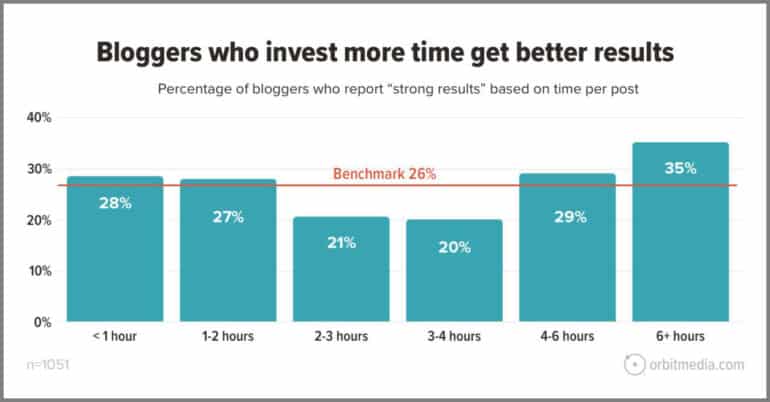Well-written (and promoted) blog posts can help bring in new clients for years. Ruth Carter analyzes Orbit Media’s annual blogger survey for tips to help you master the art of blogging.

Table of contents
- Orbit Media’s Blogging Survey: 10 Years of Results
- It’s Official: Making Time to Blog is Hard
- How Long Should Each Blog Post Be?
- How Frequently Should You Publish Blog Posts?
- More Visuals = Better Results
- What About Using AI to Write Blog Posts?
- Blogging Does Not End When You Hit “Publish”
- Blogging is Hard Work, But It’s Worth It
One of the takeaway messages I got from Content Marketing World was the majority of effective marketing is content marketing. One of the most effective strategies for content marketing is to have a blog.
I can attest to this. I fell off the blogging horse and have barely published a blog post in years, but my posts are still getting me business. In the past month, I’ve had at least three prospective clients contact me about helping them move their corporation from California to Arizona based on a blog post I wrote.
Blogging is a marketing tactic where, if you create effective content, you can create once and continue bringing in business for years.
Orbit Media’s Blogging Survey: 10 Years of Results
If blogging is part of your marketing strategy for 2024, you need to see Orbit Media’s 2023 Blogging Statistics: 10 years of Trends and Insights from 1,000+ Bloggers. This is the 10th edition of its annual blogger survey that shows what types of blog posts are yielding the best results for companies.
The survey shows that blogging continues to be an effective marketing strategy. Just over one in four bloggers reported “strong results” from their blog. (Of course, the definition of “results” varies from blogger to blogger, but it was good to see that people who blog are getting positive results from their efforts.)
(For advice on how to create blog posts that are useful for clients while keeping your SEO tight, read “Best Practices for Your Law Firm Blog,” by David Arato.)
It’s Official: Making Time to Blog is Hard
The struggle is real: half of the respondents reported that they struggle to find time to write blog posts.
Full disclosure: I was one of the respondents to this survey, and I listed this as one of my biggest challenges as a blogger. It’s even hard to make time to write my column for Attorney at Work. Many thanks to the AAW editors for being patient and understanding with me.
On average, according to this survey, a blog post takes just under four hours to write. That’s half a workday! If you bill $300 per hour, that’s $1,200 of client work you’re not doing. However, if that one post gets you six clients a year, who each need $1,000 worth of worth, the upfront cost of your time is well worth it in the long run.
And I’m still a proponent that the lawyer who wrote the blog post that brought in the client should get a cut of the profit from the work, even if they do not work on the matter in question.

Additionally, the survey results show that investing more time in content creation produces stronger results. Thus, when you are brainstorming what to write about, or sitting down to put fingers to keyboard, focus on creating quality content and the results you want will come.
(Stuck? Read “Unlock Writer’s Block: Content Marketing Tips.”)
How Long Should Each Blog Post Be?
The survey showed that most blog posts are between 500 and 1,500 words long, with the average being 1,427 words. Bloggers whose typical posts were longer were more likely to report “strong results” from their blogs. Year after year, this is one of the strongest correlations in Orbit Media’s study.
This makes sense from a legal blogging perspective. When you have “cornerstone” posts that provide a comprehensive overview of a topic, it has to be longer to cover the scope, and because you have provided so much value to the reader, they will be more likely to want to hire you.

How Frequently Should You Publish Blog Posts?
People who reported blogging daily and multiple times a week reported the best results; however, if you are both lawyer and marketer for your firm, that may not be feasible. Creating and publishing content on a weekly basis yielded good results, too.
Speaking for myself, creating and publishing a blog post once a week is a substantial challenge. One of the advantages lawyers have when it comes to marketing is that most other lawyers suck at it. Releasing a new blog post each week will put you ahead of most of your counterparts and give you an advantage in organic search results.
More Visuals = Better Results
No one wants to read a wall of text. I groan internally when a prospective client sends me a novel of an email instead of the Reader’s Digest overview of their situation. The same is true for your audience. You need visuals (images and videos) to break up the text of your blog posts into digestible chunks. Additionally, your visuals should enhance the overall story you are telling.
The survey results reflect this. Bloggers who added many images and embedded videos to their posts were far more likely to report success.
This is particularly true for longer posts. You need more visuals to break up the text to keep your audience’s eyes from glazing over.
Yes, this means you need to devote time to finding or creating images and videos to include with your posts or coordinating with a third party to do this for you. This is also partially why it takes nearly four hours to write a blog post.
What About Using AI to Write Blog Posts?
Artificial intelligence (AI) can create generic content within seconds, but that would not lead to strong results from your blog because AI can’t create content that differentiates you from the pack. Your unique voice, insights and stories will do that.

That being said, 65% of respondents reported using AI to varying degrees. Here are the top three ways bloggers use AI:
- 43% use AI to generate ideas
- 29% use AI to write headlines
- 28% use AI to write outlines
Full Disclosure: I used ChatGPT to help me write the headline for this post.
The fourth most popular way bloggers use AI is to revise what they’ve written. Earlier this year, I used some of its suggestions when I needed an out-of-office message that made me sound like a sassy evil villain. That got me a lot of positive responses from clients and opposing counsel who appreciated my non-boring auto-reply.
It’s best to think of AI as an intern. It can help you, but it can’t replace you.
So far, the research shows that bloggers who use AI are not more successful than other bloggers. However, since AI is relatively new, we will see if this changes in future editions of this survey.
Blogging Does Not End When You Hit “Publish”
One of Orbit Media Co-Founder Andy Crestodina’s best sayings is, “The best content doesn’t win; the best-promoted content wins.” It’s not enough to create quality content.
Posting links to posts on social media, sharing them via email marketing, and using search engine optimization (SEO) are the most common ways bloggers promote their work. These options are usually free or relatively cost-effective.
Bloggers who pay more attention to keywords are also more likely to report success. Remember, your keywords are the terms your audience is looking for, not necessarily the legalese we use.
I also want to promote the effectiveness of SEO for lawyers. Most prospective clients don’t need us every day. We need to be easily found when they do need us. A well-written blog post using keywords and tags can show a prospect that you understand and can help with their problem. They will decide if they like you from what they can glean about your personality from your writing style. As a result, when they contact you, they are already ready to sign an engagement agreement.
Another thing you can do after you hit “publish” is update older posts. You can revise the text to make it more reader-friendly, update out-of-date information, and add visuals. Updating older posts may also help your site with its rankings in search engine results. When you are creating your content calendar, carve out time to look back at previously published posts to see how you can improve them.
For tips on writing evergreen content, read “Compounding Returns for Content: An Evergreen Strategy.”
Blogging is Hard Work, But It’s Worth It
I’m not going to sugar-coat it. Blogging is hard work. It needs as much thoughtfulness as the work we do for our clients. When done effectively, it can be the driving force that continuously brings new business to your desk. I hope the insights from Orbit Media’s Blogging Survey help you fine-tune your blogging strategy this year.
Image © iStockPhoto.com.

Sign up for Attorney at Work’s daily practice tips newsletter here and subscribe to our podcast, Attorney at Work Today.
















